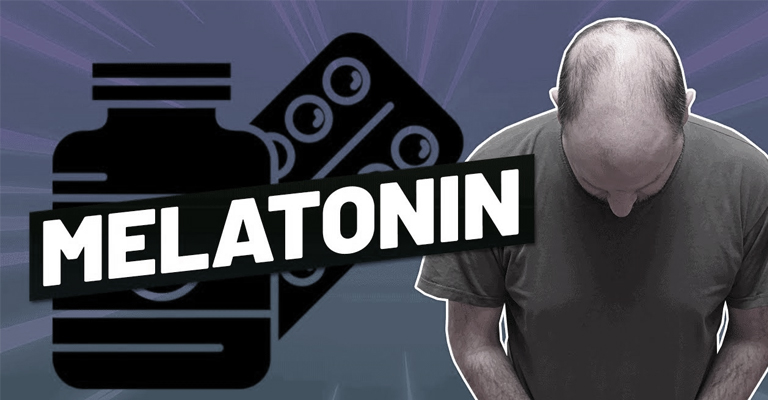Understanding The Basics
Melatonin is a hormone that is thought to control sleep cycles. It is a complex molecule that regulates the Circadian rhythm, commonly known as the internal body clock. Melatonin is produced in the pineal gland, the most mysterious organ in the human body, located in the center of the brain.In addition to regulating sleep, melatonin has other health benefits. Its antioxidant properties help to protect cells from damage.
Melatonin is also being studied for its potential to treat various health conditions, including insomnia, seasonal affective disorder, and jet lag. It is thought to have benefits for individuals with depression, anxiety, and other mood disorders, as well as for those undergoing chemotherapy or radiation therapy.
In medical science, melatonin is used to cure inflammation, strengthen the immune system, promote cancer treatment, and protect the cardiovascular system.
Melatonin’s Relevance to Hair Growth
Research suggests that there is a direct link between hair growth and melatonin. Melatonin regulates the production of other hormones, such as DHT (dihydrotestosterone), a major contributor to hair loss in both men and women. By regulating the levels of DHT, melatonin helps keep the hair growth cycle healthy. Conversely, when melatonin levels are low, the production of DHT is not properly controlled, leading to hair loss.
Many studies have shown that an increase in melatonin levels can promote hair growth and prevent hair loss. The hormone’s ability to stimulate the production of keratin, a protein that is essential for hair growth, is the primary reason behind this. Additionally, melatonin increases blood flow to the scalp, which is important for delivering essential nutrients to hair follicles. This, in turn, helps to support healthy hair growth.
Melatonin Viability and Treatment Plan
While the exact mechanisms of how melatonin impacts hair growth are still being studied, the evidence to suggest its positive effects on hair growth is plenty. Hence, melatonin is a significant candidate for hair loss treatment, especially for those patients seeking a natural hormone-based approach.
However, there are several ways in which melatonin can be used to promote healthy hair growth. Here are the top viable options to choose from:
Melatonin Supplements: These supplements are readily available over the counter and can be taken orally. The recommended dose usually varies depending on the individual’s needs and the severity of their hair loss. However, it’s important to talk to a doctor or hair specialist before starting any new supplement regimen to determine the right dose and ensure that it is safe and effective.
Topical Melatonin: Topical melatonin treatments can also be applied directly to the scalp. Topical treatments work by delivering Melatonin to the hair follicles. It then regulates the levels of other hormones and increases healthy hair growth. Topical melatonin-based medicines are also available over-the-counter.
Combination Therapy: Melatonin can be combined with other medications, such as minoxidil or finasteride, to enhance its effects on hair growth. In combination therapy, melatonin and finasteride work together to have a more comprehensive impact on hair growth. Melatonin promotes hair growth directly, and finasteride reduces the negative effects of DHT on hair follicles, ultimately leading to great results for the patient.
Scalp Injections: Scalp injections allow for the direct delivery of melatonin to the hair follicles, stimulating hair growth and improving the hair follicles’ overall health. Scalp injections are a relatively non-invasive method of delivering melatonin and can be done in a doctor’s office. The exact dose and frequency of scalp injections may vary depending on the individual and the desired outcome. But they certainly are a viable and powerful option for patients experiencing acute hair loss.
Lifestyle Changes: Lifestyle changes are important in increasing melatonin levels and potentially countering hair loss. Some ways to achieve this include getting adequate sleep (aim for 7-9 hours per night), reducing stress, limiting or avoiding alcohol consumption, increasing exposure to natural light, and consuming a diet rich in vitamins and minerals, such as vitamins B6 and C. When patients make these changes, increased melatonin levels in their body help regulate their circadian rhythms and positively impact hair growth.
The Takeaway
The efficacy of melatonin in the treatment of hair loss largely depends on the method of delivery. Each delivery method has its advantages and disadvantages. Hence, factors such as convenience, effectiveness, and potential side effects when choosing a melatonin-based treatment plan for hair loss are the ones you must consider when opting for melatonin treatment.
Since melatonin plays a very important role in regulating sleep and circadian rhythms, the time of its use also influences its efficacy in hair loss treatment. In combination therapy involving melatonin, its effectiveness in hair loss treatment can vary depending on the compound used. Since the number of variables is many, the desired results require close collaboration between the doctor and the patient.
The doctor must understand what form of melatonin treatment suits a patient’s body, and the patient must adhere to the doctor’s instructions.
Drop us a line today to learn if you should consider melatonin treatment for your hair loss conditions. Our team of experts will guide you effectively to help you find the best treatment plan possible.
If you have questions about which hair transplant procedure is the best for you, fix an appointment to speak to our experts. We offer comprehensive consultation and counselling for patients who seek detailed information about surgical and non-surgical hair transplant methods.
